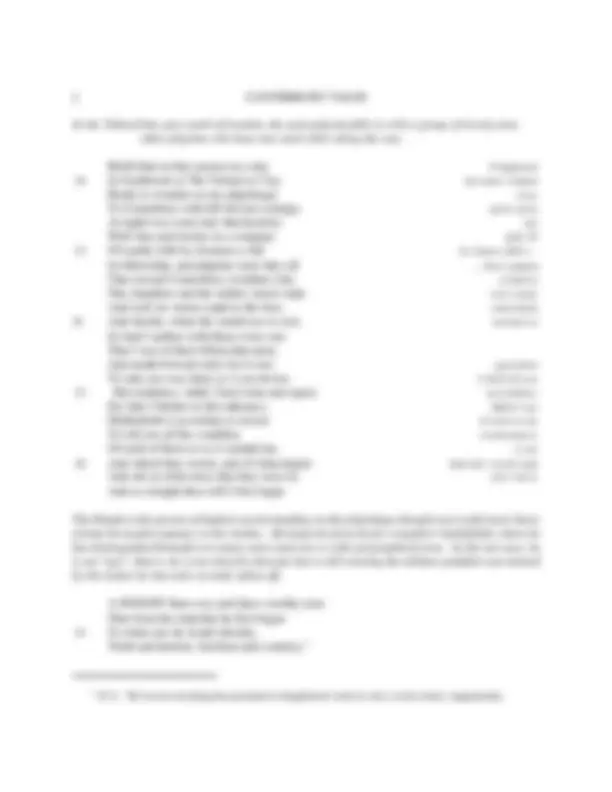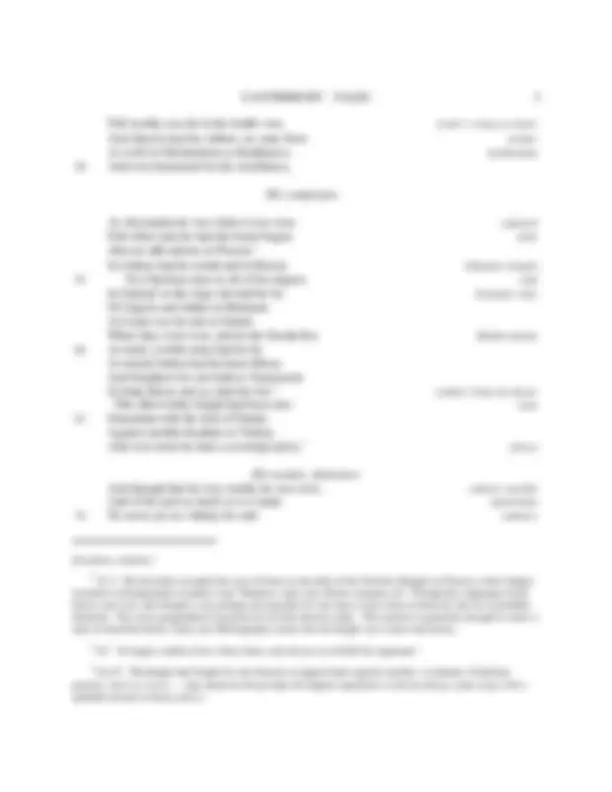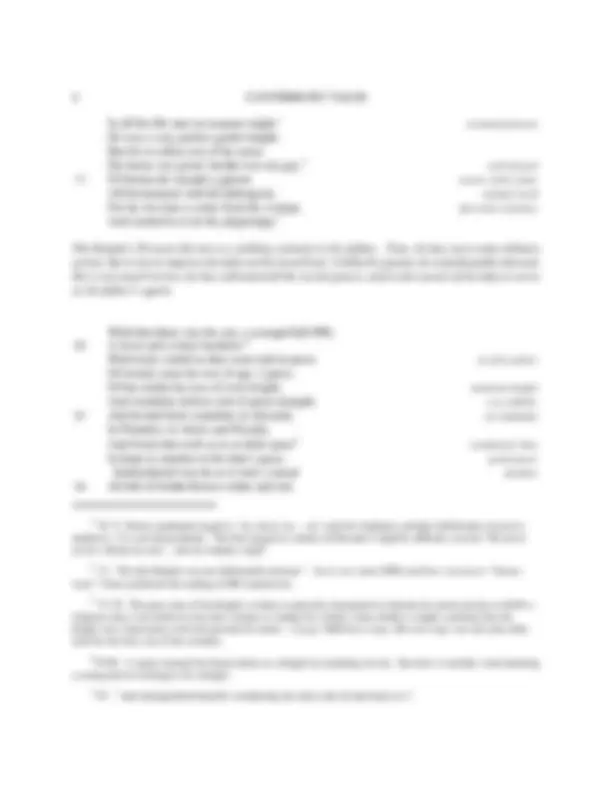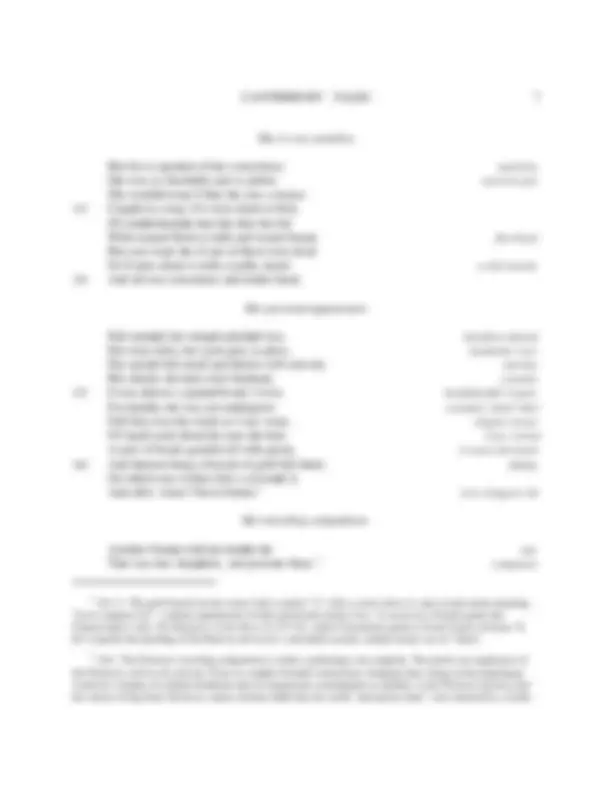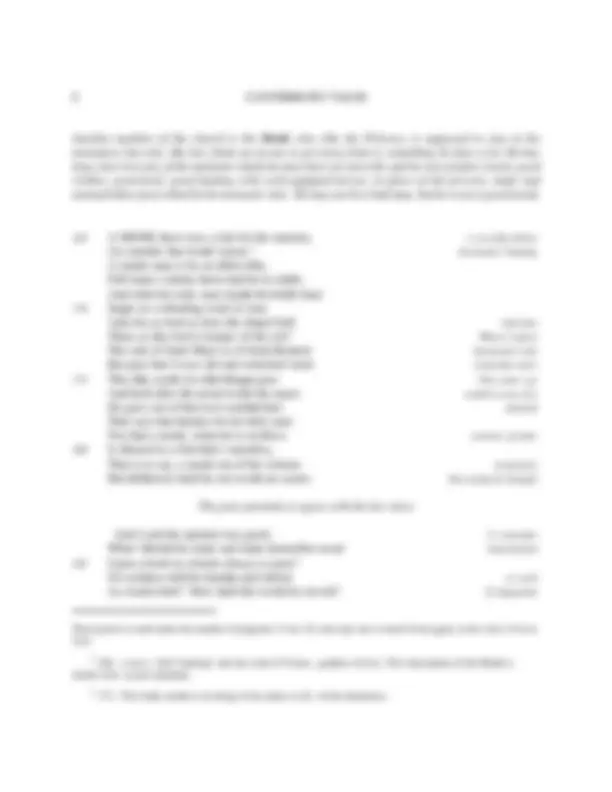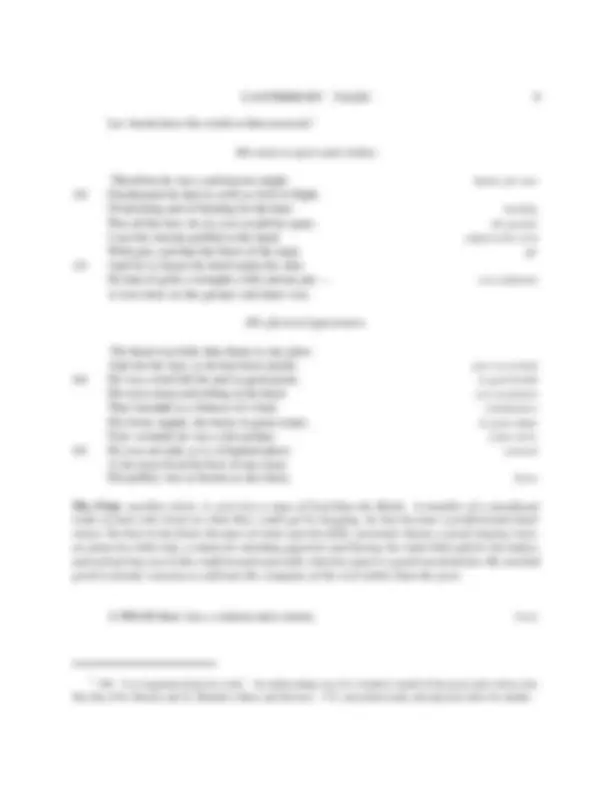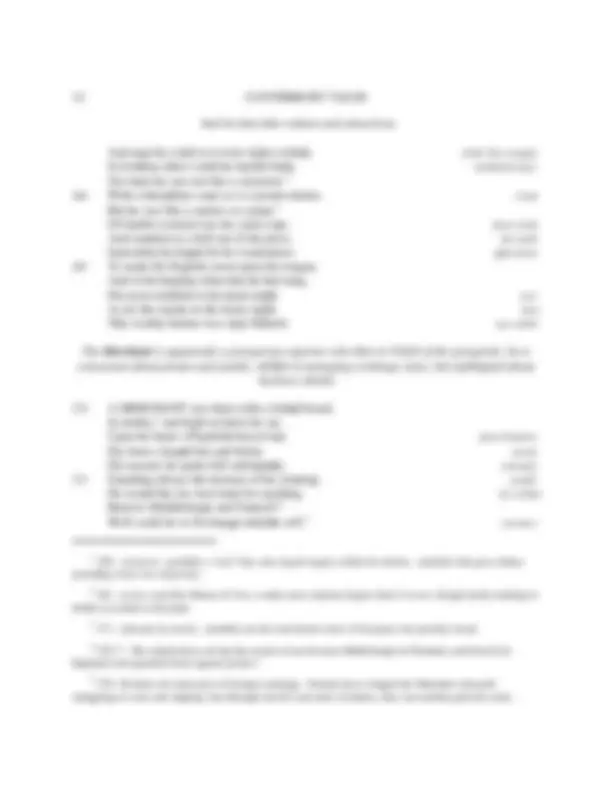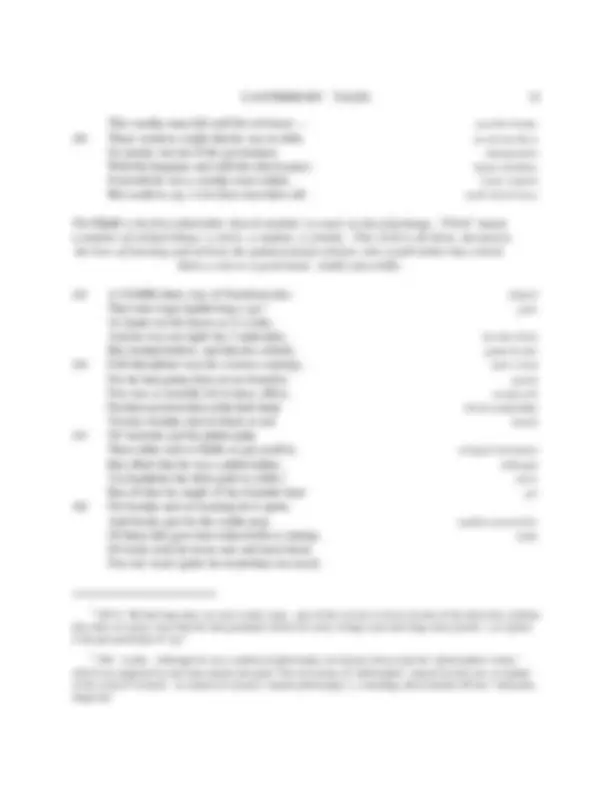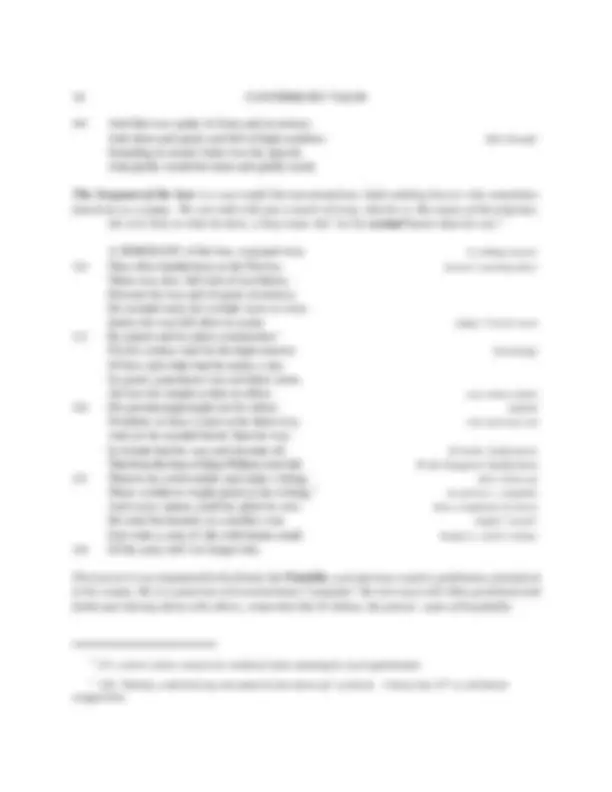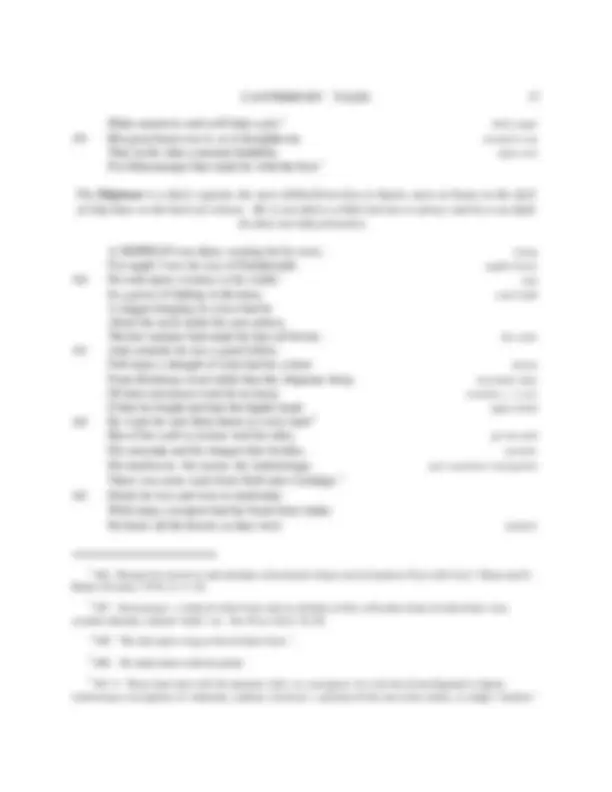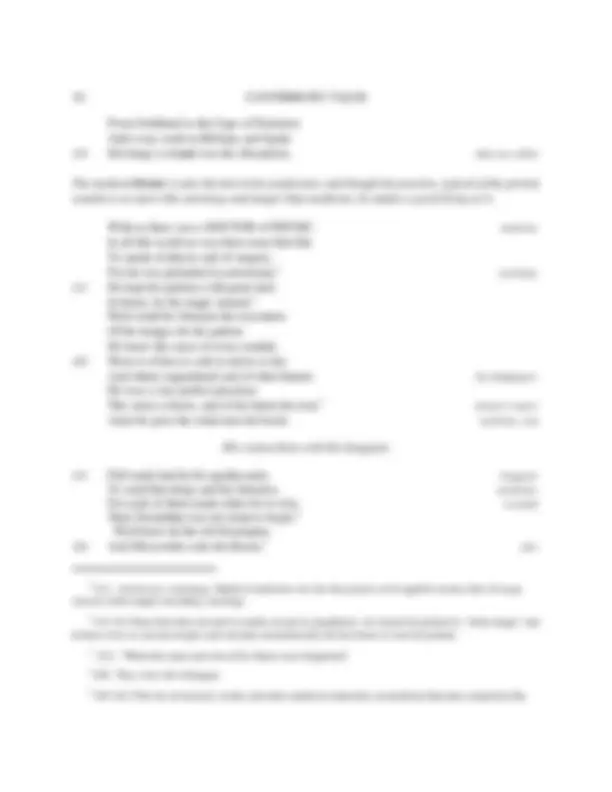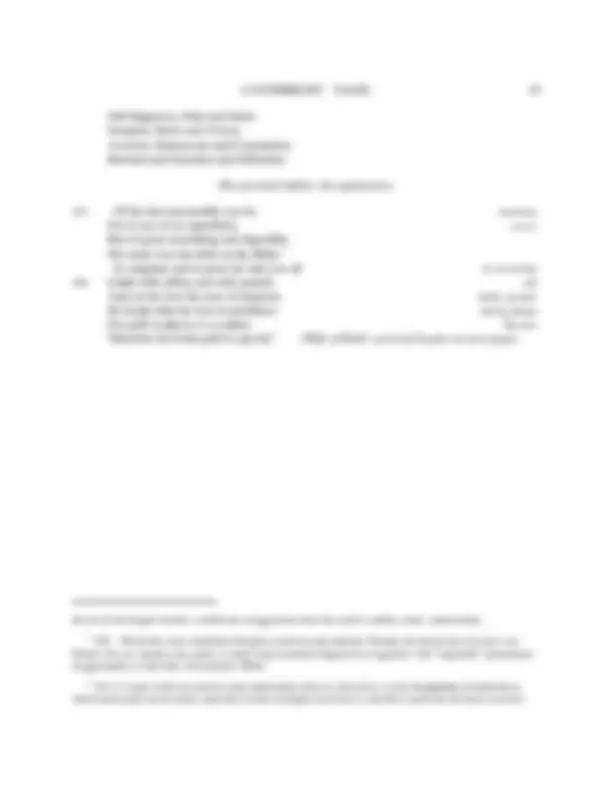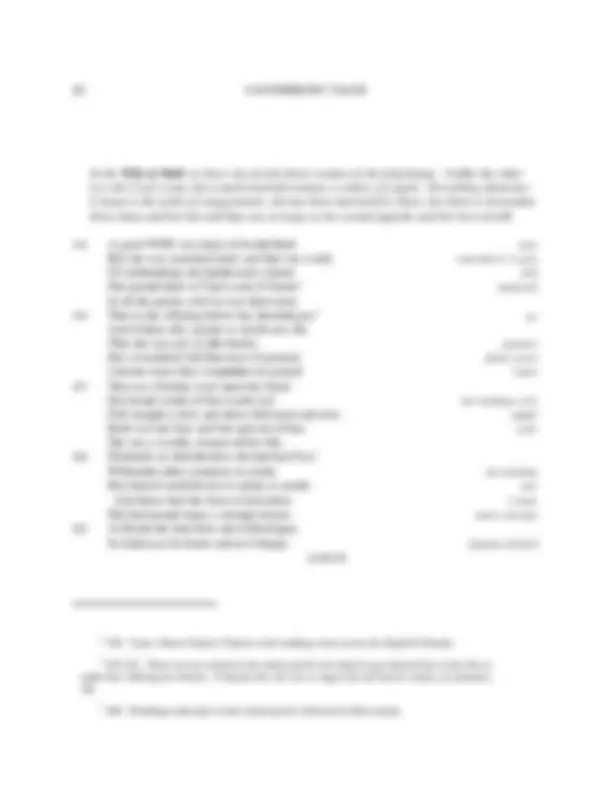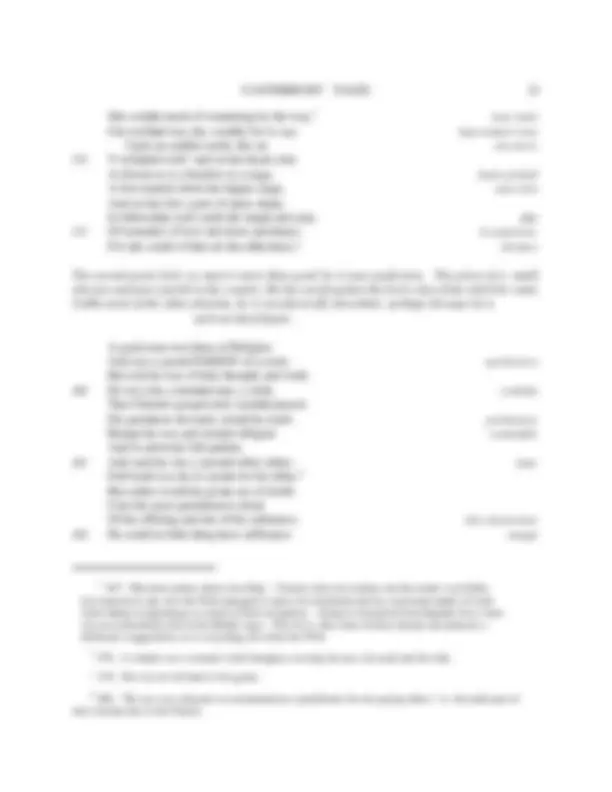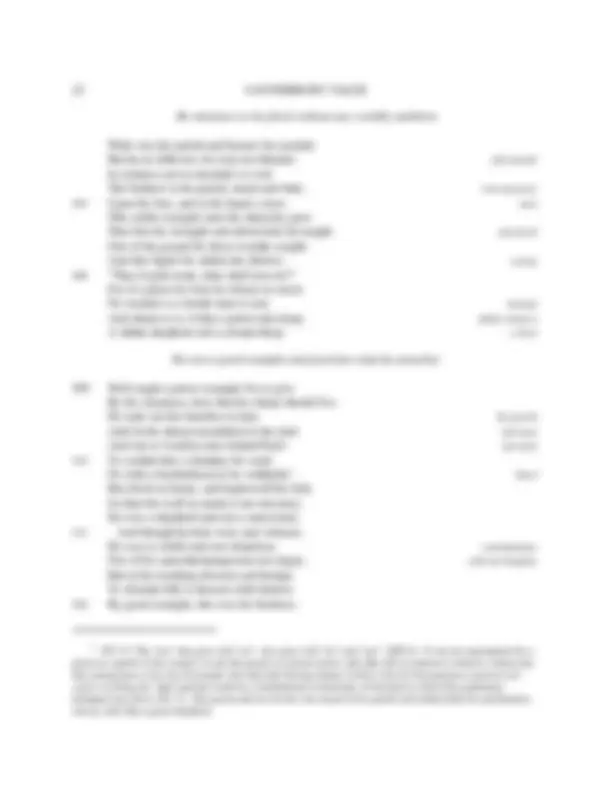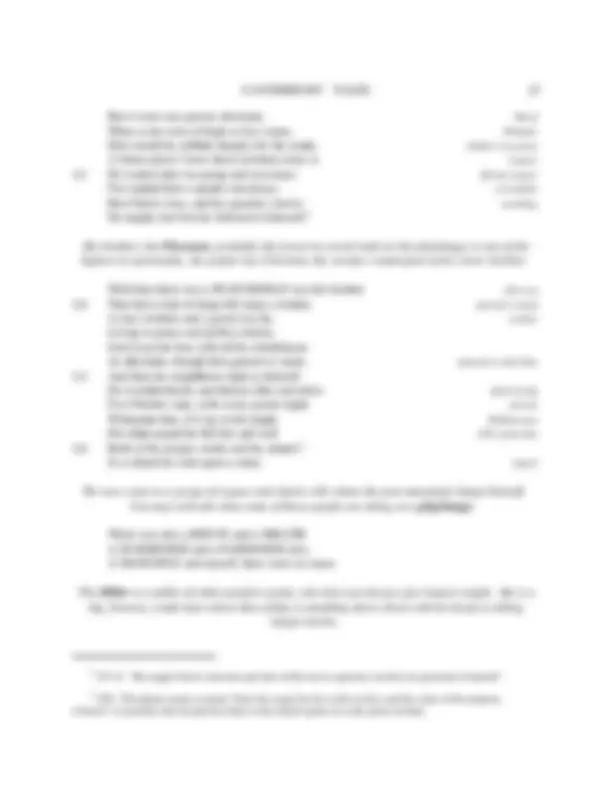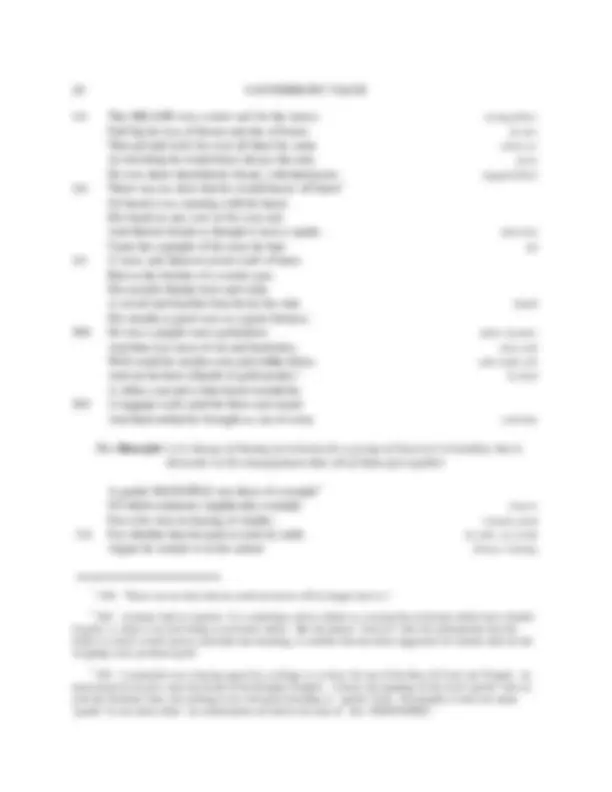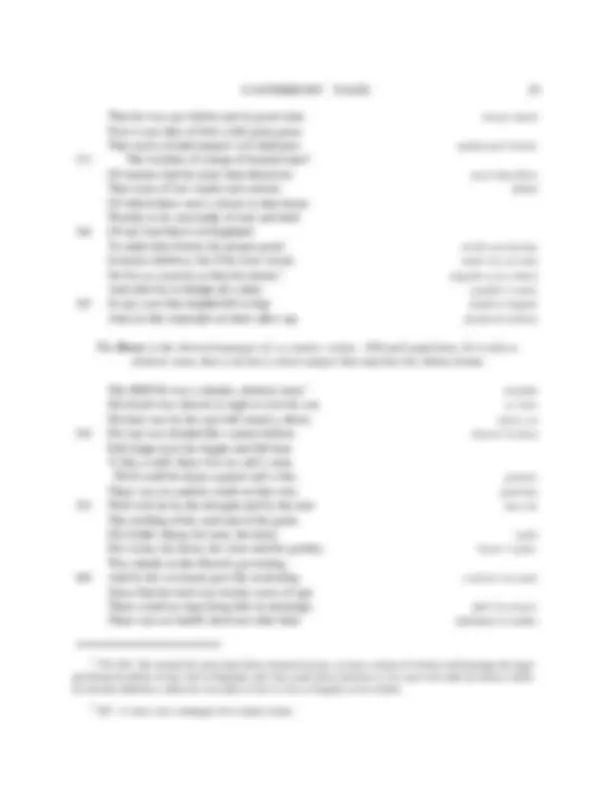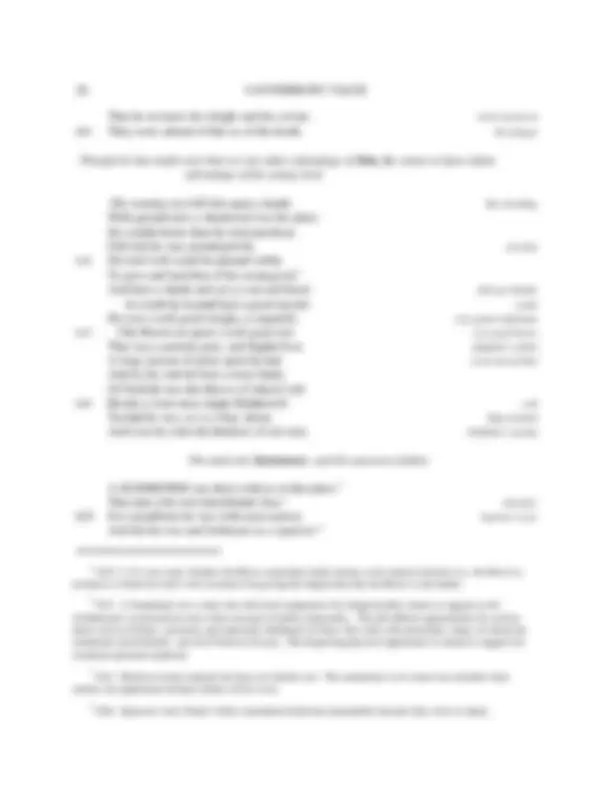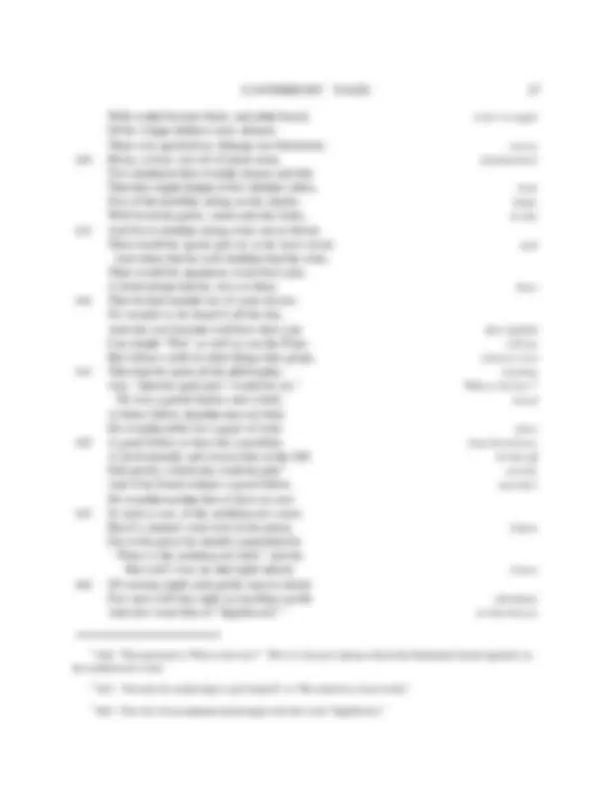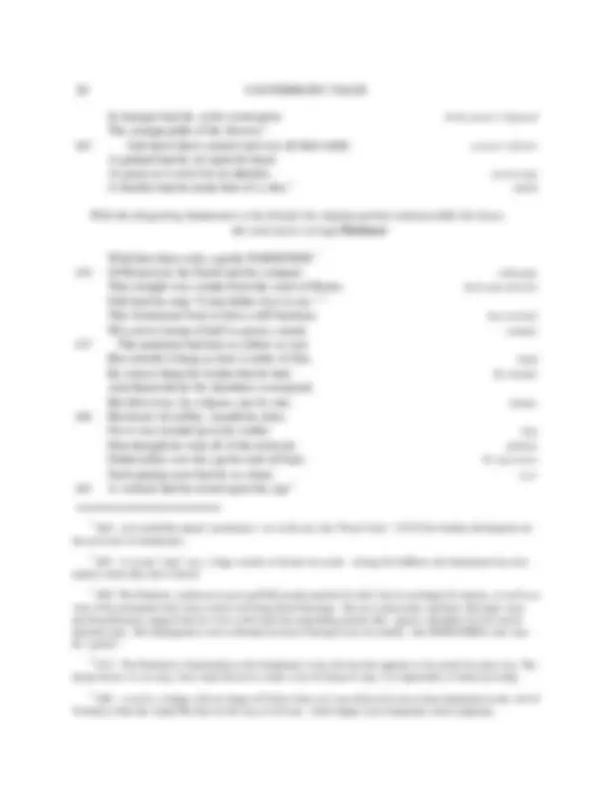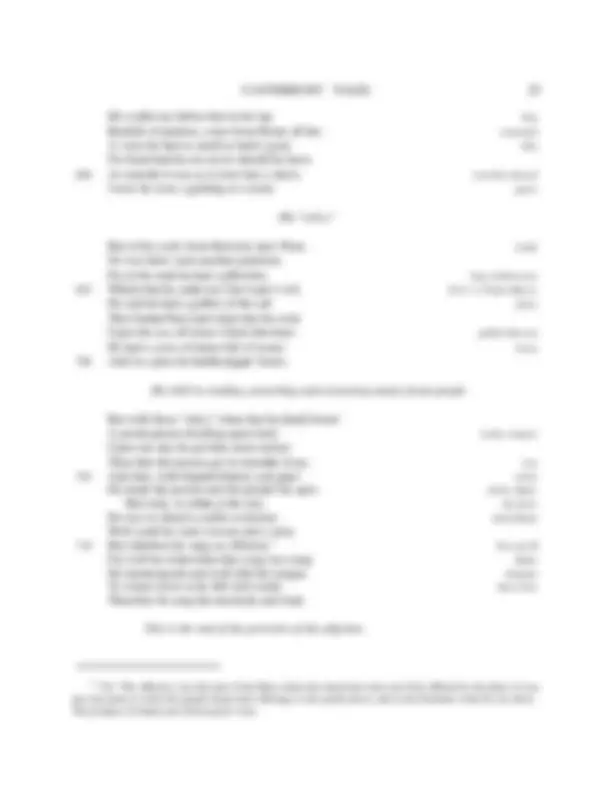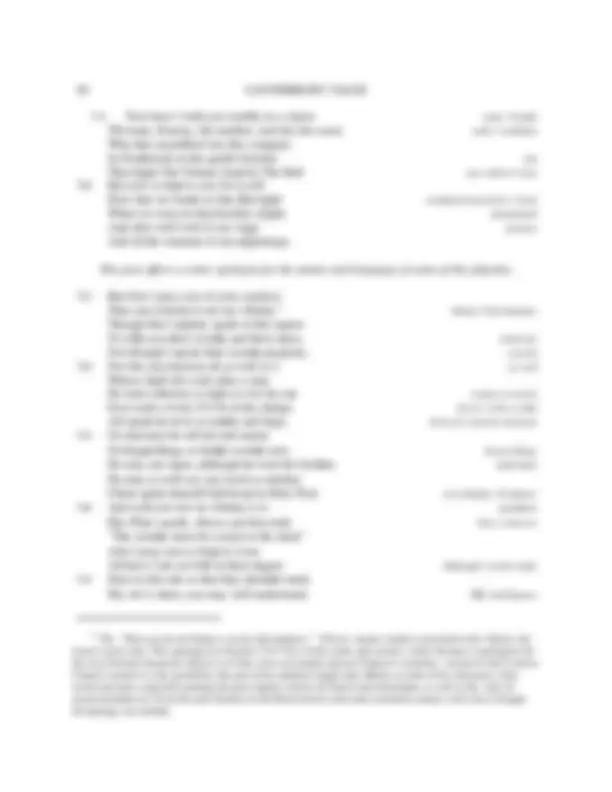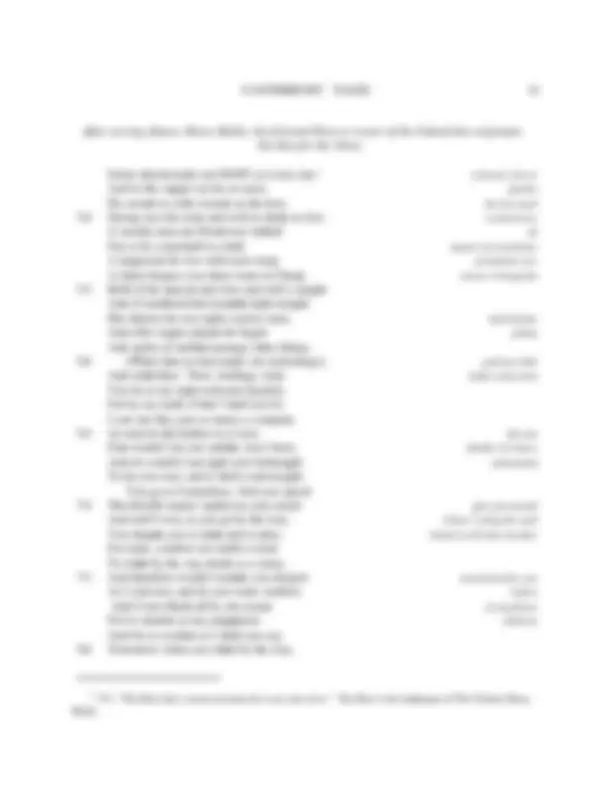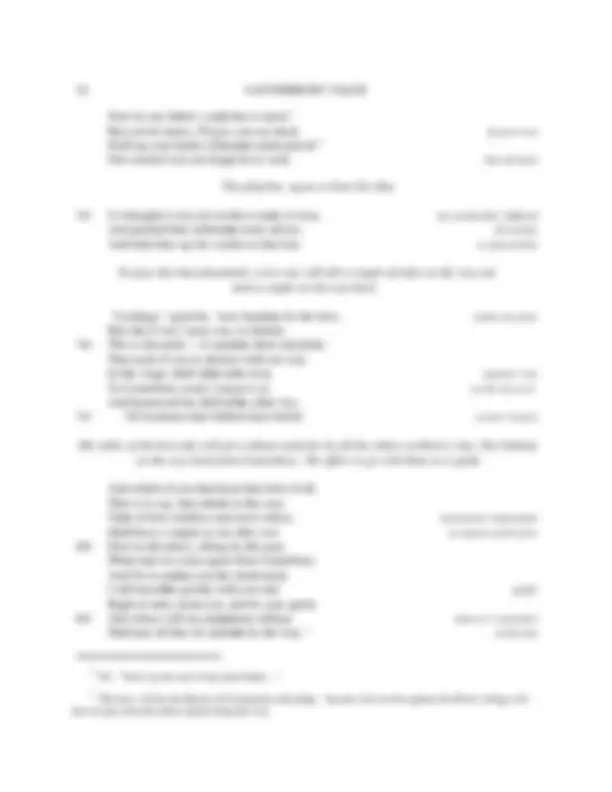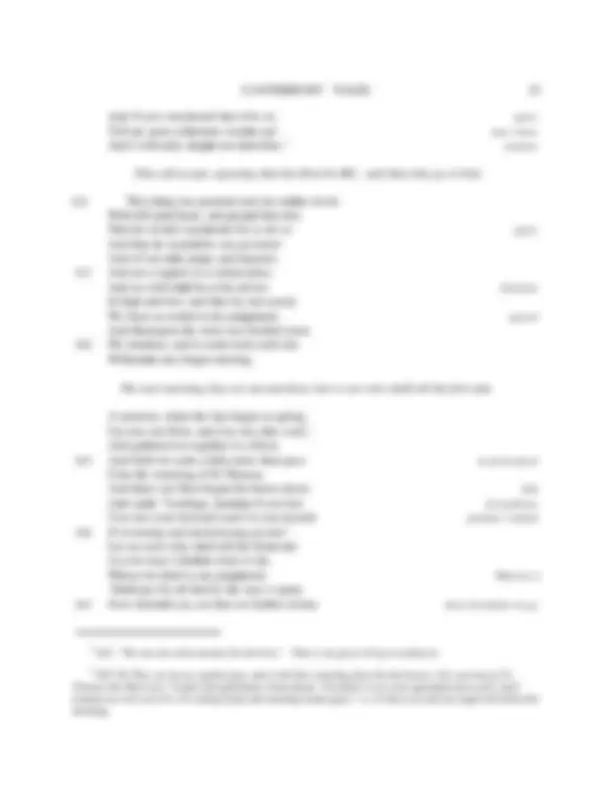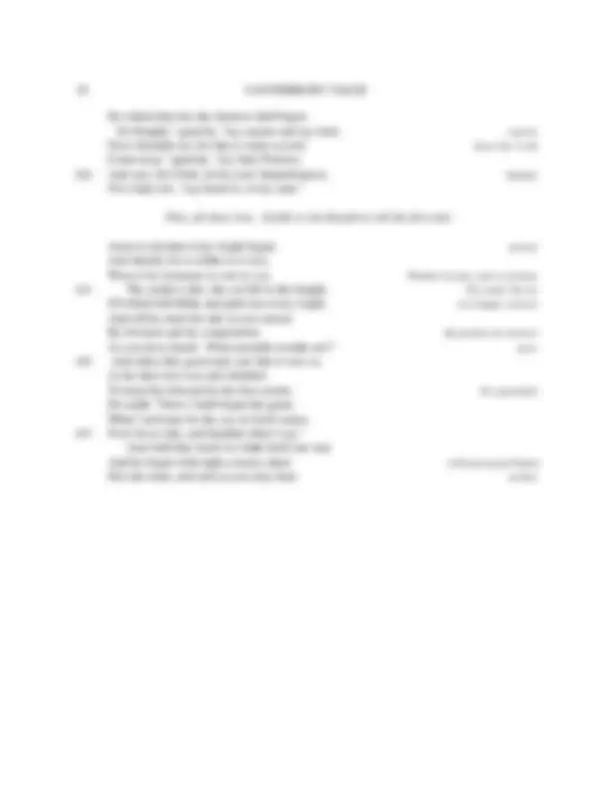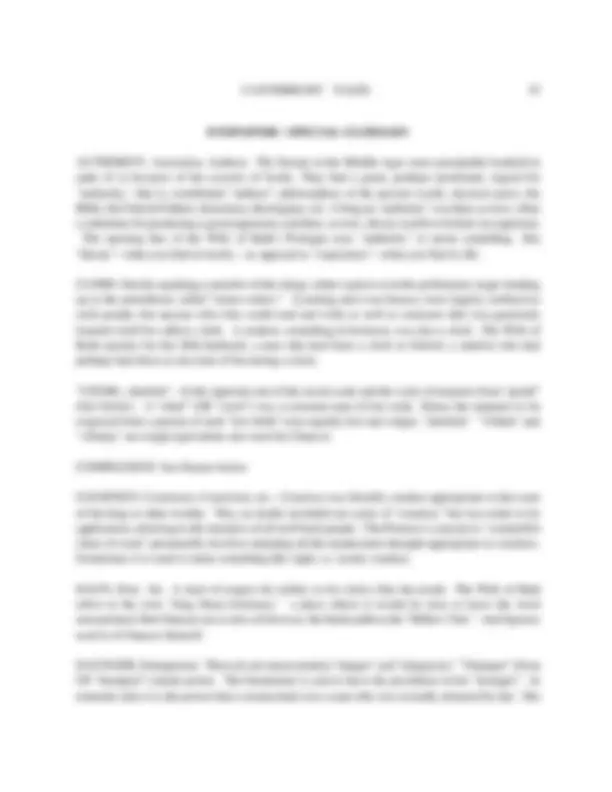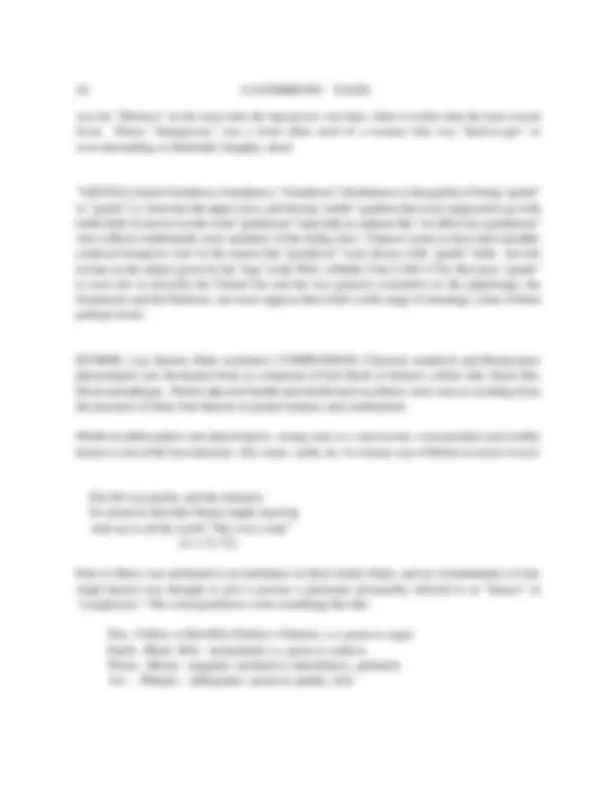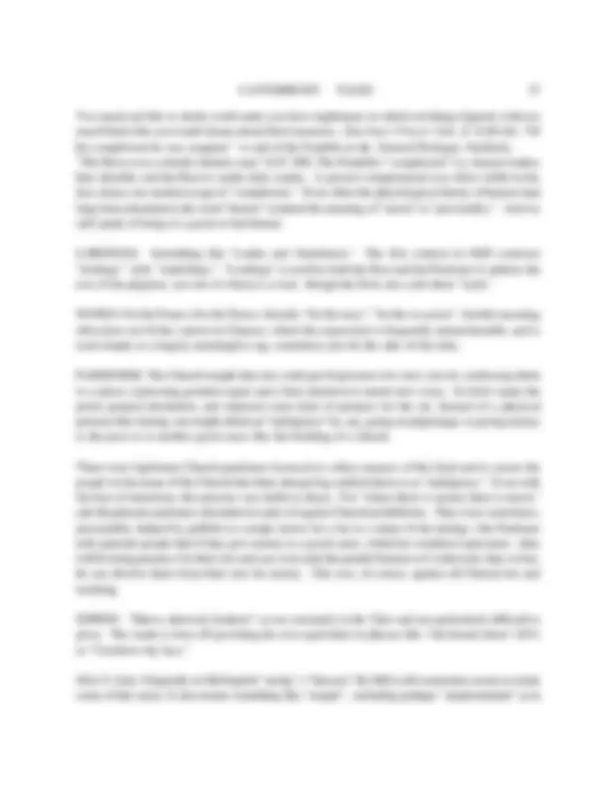Download the canterbury tales pdf and more Study notes Literature in PDF only on Docsity!
The Canterbury Tales
by
GEOFFREY CHAUCER
A READER-FRIENDLY EDITION
Put into modern spelling
by
MICHAEL MURPHY
GENERAL PROLOGUE
(^1) When April with its sweet showers has pierced the drought of March to the root and bathed every rootlet in
the liquid by which the flower is engendered; when the west wind also, with its sweet breath, has brought forth young shoots in every grove and field; when the early sun of spring has run half his course in the sign of Aries, and when small birds make melody, birds that sleep all night with eyes open, (as Nature inspires them to) --THEN people have a strong desire to go on pilgrimages, and pilgrims long to go to foreign shores to distant shrines known in various countries. And especially they go from every county in England to seek out the shrine of the holy blessed martyr who has helped them when they were sick.
(^2) 4: "By virtue (strength) of which the flower is engendered."
(^3) 8: The early sun of Spring has moved part way through the sign of Aries (the Ram) in the Zodiac.
(^4) 13-14: "Pilgrims seek foreign shores (to go) to distant shrines known in different lands." Palmers : pilgrims,
from the palm-leaves they got in Jerusalem.
GENERAL PROLOGUE
The opening is a long, elaborate sentence about the effects of Spring on the vegetable and animal
world, and on people. The style of the rest of the Prologue and Tales is much simpler than this
opening. A close paraphrase of the opening sentence is offered at the bottom of this page.^1
W hen that April with his showers soote its showers sweet
The drought of March hath piercèd to the root
And bathèd every vein in such liquor rootlet / liquid
Of which virtúe engendered is the flower;^2
5 When Zephyrus eke with his sweetè breath West Wind also
Inspirèd hath in every holt and heath grove & field
The tender croppès, and the youngè sun young shoots / Spring sun
Hath in the Ram his halfè course y-run,^3 in Aries / has run
And smallè fowlès maken melody little birds
10 That sleepen all the night with open eye Who sleep
(So pricketh them Natúre in their couráges), spurs / spirits
Then longen folk to go on pilgrimáges, people long
And palmers for to seeken strangè strands pilgrims / shores
To fernè hallows couth in sundry lands,^4 distant shrines known
15 And specially from every shirè's end county's
Of Engèland to Canterbury they wend go
The holy blissful martyr for to seek, St. Thomas Becket
That them hath holpen when that they were sick. Who has helped them
( freedom ), courtesy."
(^1) 52-3: He had often occupied the seat of honor at the table of the Teutonic Knights in Prussia, where badges
awarded to distinguished crusaders read "Honneur vainc tout: Honor conquers all." Though the campaigns listed below were real, and though it was perhaps just possible for one man to have been in them all, the list is probably idealized. The exact geographical locations are of little interest today. This portrait is generally thought to show a man of unsullied ideals; Jones (see Bibliography) insists that the knight was a mere mercenary.
(^2) 63: "In single combat ( listes ) three times, and always ( ay ) killed his opponent."
(^3) 64-67: The knight had fought for one Saracen or pagan leader against another, a common, if dubious,
practice. And ever more ... may mean he always kept the highest reputation or that he always came away with a splendid reward or booty ( prize)..
Full worthy was he in his lordè's war, lorde's = king's or God's
And thereto had he ridden--no man farre farther
As well in Christendom as Heatheness heathendom
50 And ever honoured for his worthiness.
His campaigns
At Alexandria he was when it was won. captured
Full often time he had the board begun table
Aboven allè natïons in Prussia.^1
In Lithow had he reisèd and in Russia Lithuania / fought
55 No Christian man so oft of his degree. rank
In Gránad' at the siege eke had he be Granada / also
Of Algesir and ridden in Belmarie.
At Leyès was he and at Satalie
When they were won, and in the Greatè Sea Mediterranean
60 At many a noble army had he be.
At mortal battles had he been fifteen
And foughten for our faith at Tramissene
In listès thricè, and ay slain his foe.^2 combat 3 times & always
This ilkè worthy knight had been also same
65 Sometimè with the lord of Palatie
Against another heathen in Turkey,
And ever more he had a sovereign prize,^3 always
His modest demeanor
And though that he was worthy he was wise, valiant / sensible
And of his port as meek as is a maid. deportment
70 Ne never yet no villainy he said rudeness
(^1) 70-71: Notice quadruple negative: "ne, never, no ... no" used for emphasis, perhaps deliberately excessive
emphasis. It is not bad grammar. The four negatives remain in Ellesmer's slightlly different version: "He never yet no villainy ne said ... unto no manner wight"
(^2) 74: "He (the Knight) was not fashionably dressed." horse was : most MSS read hors weere(n) = "horses
were." I have preferred the reading of MS Lansdowne.
(^3) 75-78: The poor state of the knight's clothes is generally interpreted to indicate his pious anxiety to fulfill a
religious duty even before he has had a chance to change his clothes. Jones thinks it simply confirms that the knight was a mercenary who had pawned his armor. voyage : MSS have viage. Blessed viage was the term often used for the holy war of the crusades.
(^4) 79-80: A squire learned his future duties as a knight by attending on one. Bachelor is another word meaning
a young man in training to be a knight.
(^5) 87: "And distinguished himself, considering the short time he had been at it."
In all his life unto no manner wight.^1 no kind of person
He was a very perfect gentle knight.
But for to tellen you of his array:
His horse was good; but he was not gay.^2 well dressed
75 Of fustian he wearèd a gipoun coarse cloth / tunic
All besmotered with his habergeon, stained / mail
For he was late y-come from his voyáge, just come / journey
And wentè for to do his pilgrimáge.^3
The Knight's 20-year-old son is a striking contrast to his father. True, he has seen some military
action, but it was to impress his lady not his Lord God. Unlike his parent, he is fashionably dressed.
He is very much in love, he has cultivated all the social graces, and is also aware of his duty to serve
as his father's squire
With him there was his son, a youngè SQUIRE,
80 A lover and a lusty bachelor 4
With locks curled as they were laid in press. as if in curlers
Of twenty years he was of age, I guess.
Of his statúre he was of even length, moderate height
And wonderly deliver and of great strength, very athletic
85 And he had been sometime in chivachy on campaign
In Flanders, in Artois and Picardy,
And borne him well as in so little space^5 conducted / time
In hope to standen in his lady's grace. good graces
Embroidered was he as it were a mead meadow
90 All full of freshè flowers white and red.
(^1) 120: The joke that presumably lurks in this line is not explained by the usual annotation that St. Eloy (or
Loy or Eligius) was a patron saint of goldsmiths and of carters.
(^2) 123: Another joke presumably, but again not adequately explained.
(^3) 126: This is a snigger at the provincial quality of the lady's French, acquired in a London suburb, not in
Paris. Everything about the prioress is meant to suggest affected elegance of a kind not especially appropriate in a nun: her facial features, her manners, her jewelry, her French, her clothes, her name. Eglantine = "wild rose" or "sweet briar." Madame = "my lady."
(^4) 139-40: She took pains to imitate the manners of the (king's) court.
manners and is exquisitely sensitive to animal rights; she speaks French -- after a fashion; she has
a pretty face and knows it; her nun's habit is elegantly tailored, and she displays discreetly a little
tasteful jewelry: a gold brooch on her rosary embossed with the nicely ambiguous Latin motto:
Amor Vincit Omnia, Love conquers all.
There was also a nun, a PRIORESS, head of a convent
That of her smiling was full simple and coy. modest
120 Her greatest oath was but by Saint Eloy,^1
And she was clepèd Madame Eglantine. called
Full well she sang the servicè divine
Entunèd in her nose full seemèly.^2
And French she spoke full fair and fetisly nicely
125 After the school of Stratford at the Bow,
For French of Paris was to her unknow.^3
At meatè well y-taught was she withall: meals / indeed
She let no morsel from her lippès fall,
Nor wet her fingers in her saucè deep.
130 Well could she carry a morsel and well keep handle
That no drop ne fell upon her breast. So that
In courtesy was set full much her lest: v. much her interest
Her over lippè wipèd she so clean upper lip
That in her cup there was no farthing seen small stain
135 Of greasè, when she drunkèn had her draught.
Full seemèly after her meat she raught, reached for her food
And sikerly she was of great desport certainly / charm
And full pleasánt and amiable of port, behavior
And painèd her to counterfeitè cheer imitate the manners
140 Of court,^4 and be estately of mannér,
And to be holden digne of reverence. thought worthy
(^1) 161-2: The gold brooch on her rosary had a capital "A" with a crown above it, and a Latin motto meaning
"Love conquers all," a phrase appropriate to both sacred and secular love. It occurs in a French poem that Chaucer knew well, The Romance of the Rose (21327-32), where Courteoisie quotes it from Virgil's Eclogue X, 69, to justify the plucking of the Rose by the Lover, a decidedly secular, indeed sexual, act of "Amor".
(^2) 164: The Prioress's traveling companion is called, confusingly, her chaplain. The priests are employees of
the Prioress's well-to-do convent. Even in a market flooded with priests, bringing three along on the pilgrimage would be a display of celibate feminism and of conspicuous consumption as marked as the Prioress's jewelry and her choice of dog food. However, many scholars think that the words "and priests three" were inserted by a scribe.
She is very sensitive
But for to speaken of her conscïence: sensitivity
She was so charitable and so pitóus moved to pity
She wouldè weep if that she saw a mouse
145 Caught in a trap, if it were dead or bled.
Of smallè houndès had she that she fed
With roasted flesh or milk and wastel bread, fine bread
But sore wept she if one of them were dead
Or if men smote it with a yardè, smart; a stick smartly
150 And all was conscïence and tender heart.
Her personal appearance
Full seemèly her wimple pinchèd was, headdress pleated
Her nose tretis, her eyen grey as glass, handsome / eyes
Her mouth full small and thereto soft and red, and also
But sikerly she had a fair forehead. certainly
155 It was almost a spannè broad, I trow, handsbreadth / I guess
For hardily she was not undergrow. certainly / short? thin?
Full fetis was her cloak as I was 'ware. elegant / aware
Of small coral about her arm she bare bore, carried
A pair of beads gauded all with green, A rosary decorated
160 And thereon hung a brooch of gold full sheen shining
On which was written first a crownèd A
And after: Amor Vincit Omnia.^1 Love Conquers All
Her traveling companions
Another Nunnè with her haddè she nun
That was her chapèlain, and priestès three.^2 companion
(^1) 188: "Let Augustine keep his work." An unbecoming way for a monk to speak of the great saint whose rule,
like that of St. Maurus and St. Benedict ( Maur and Bennett, 173) prescribed study and physical labor for monks.
Let Austin have his swink to him reserved.^1
His taste in sport and clothes
Therefore he was a prickasour aright. hunter, for sure
190 Greyhounds he had as swift as fowl in flight.
Of pricking and of hunting for the hare tracking
Was all his lust, for no cost would he spare. his passion
I saw his sleevès purfled at the hand edged at the wrist
With gris, and that the finest of the land, fur
195 And for to fasten his hood under his chin
He had of gold y-wrought a full curious pin — very elaborate
A love knot on the greater end there was.
His physical appearance
His head was bald, that shone as any glass
And eke his face, as he had been anoint. also / as if oiled
200 He was a lord full fat and in good point, in good health
His eyen steep and rolling in his head eyes prominent
That steamèd as a furnace of a lead, lead furnace
His boots supple, his horse in great estate. in great shape
Now certainly he was a fair prelate. a fine cleric
205 He was not pale as is a forpined ghost. tortured
A fat swan loved he best of any roast.
His palfrey was as brown as any berry. horse
The Friar , another cleric, is even less a man of God than the Monk. A member of a mendicant
order of men who lived on what they could get by begging, he has become a professional fund-
raiser, the best in his friary because of some special skills: personal charm, a good singing voice,
an attractive little lisp, a talent for mending quarrels and having the right little gift for the ladies,
and a forgiving way in the confessional especially when he expects a generous donation. He can find
good economic reasons to cultivate the company of the rich rather than the poor.
A FRIAR there was, a wanton and a merry, lively
(^1) 208-9: A Friar (Fr. frère ) was a member of one of four religious orders of men. Some were "mendicants,"
who depended on what they could get by begging. Our friar, a limiter , has a begging district within which he must stay. "Solempne" cannot mean solemn except as heavy irony. See l. 274
(^2) 212-13: He had provided dowries for many young women, or he had performed the marriage ceremonies
without a fee.
(^3) 218-220: Sometimes the pope or bishop would reserve to himself or to a special delegate (licenciate) the
right to hear the confessions of prominent public sinners, guilty of particularly heinous offences. This would have no relevance to the ordinary confession-goer, for whom the Friar had no more "power of confession" than the curate or parson.
(^4) 227-8: "For if he (the penitent) gave (an offering), he (the Friar) would dare to say that he knew the man
was truly repentant."
A limiter, a full solémpnè man.^1 licensed beggar / v. impressive
210 In all the orders four is none that can knows
So much of dalliance and fair language. smooth manners
He had made full many a marrïage
Of youngè women at his ownè cost.^2
Unto his order he was a noble post. pillar
215 Full well beloved and familiar was he
With franklins over all in his country, landowners
And eke with worthy women of the town, And also
For he had power of confessïon,
As said himself, more than a curate, parish priest
220 For of his order he was licentiate.^3 licensed
His manner in the confessional
Full sweetèly heard he confessïon
And pleasant was his absolutïon.
He was an easy man to give penánce
There as he wist to have a good pittánce, expected / offering
225 For unto a poor order for to give
Is signè that a man is well y-shrive, confessed
For if he gave, he durstè make avaunt dared / boast
He wistè that a man was répentaunt,^4 knew
For many a man so hard is of his heart,
230 He may not weep though that he sorè smart. it hurt him sharply
Therefore, instead of weeping and [of] prayers
Men may give silver to the poorè freres. friars
(^1) 259: cloisterer : probably a "real" friar who stayed largely within his cloister, satisfied with poor clothes
according to his vow of poverty.
(^2) 261: master : possibly Master of Arts, a rather more eminent degree than it is now, though hardly making its
holder as exalted as the pope.
(^3) 271: (dressed in) motley : probably not the loud mixed colors of the jester, but possibly tweed.
(^4) 276-7: "He wished above all that the stretch of sea between Middleburgh (in Flanders) and Orwell (in
England) were guarded ( kept ) against pirates."
(^5) 278: He knew the intricacies of foreign exchange. Scholars have charged the Merchant with gold
smuggling or even coin clipping; but although shields were units of money, they were neither gold nor coins.
And he had other talents and attractions
And rage he could as it were right a whelp. frolic like a puppy
In lovèdays there could he muchel help, mediation days
For there he was not like a cloisterer 1
260 With a threadbare cope as is a poorè scholar, cloak
But he was like a master or a pope.^2
Of double worsted was his semi-cope, short cloak
And rounded as a bell out of the press. the mold
Somewhat he lispèd for his wantonness affectation
265 To make his English sweet upon his tongue,
And in his harping when that he had sung,
His eyen twinkled in his head aright eyes
As do the starrès in the frosty night. stars
This worthy limiter was clept Huberd. was called
The Merchant is apparently a prosperous exporter who likes to TALK of his prosperity; he is
concerned about pirates and profits, skillful in managing exchange rates, but tightlipped about
business details.
270 A MERCHANT was there with a forkèd beard,
In motley,^3 and high on horse he sat,
Upon his head a Flandrish beaver hat, from Flanders
His boots claspèd fair and fetisly. neatly
His reasons he spoke full solémpnèly, solemnly
275 Sounding always the increase of his winning. profits
He would the sea were kept for anything he wished
Betwixt Middleburgh and Orèwell.^4
Well could he in Exchangè shieldès sell.^5 currency
(^1) 285-6: He had long since set out to study logic, part of the trivium or lower section of the university syllabus
(the other two parts were rhetoric and grammar); hence his early college years had long since passed. y-go (gone) is the past participle of "go."
(^2) 298: A joke. Although he was a student of philosophy, he had not discovered the "philosopher's stone,"
which was supposed to turn base metals into gold. The two senses of "philosopher" played on here are: a) student of the work of Aristotle b) student of science ("natural philosophy"), a meaning which shaded off into "alchemist, magician."
This worthy man full well his wit beset — used his brains
280 There wistè no wight that he was in debt, no person knew
So stately was he of his governance management
With his bargains and with his chevissance. money dealings
Forsooth he was a worthy man withal, Truly / indeed
But sooth to say, I n'ot how men him call. truth I don't know
The Clerk is the first admirable church member we meet on the pilgrimage. "Clerk" meant
a number of related things: a cleric, a student, a scholar. This clerk is all three, devoted to
the love of learning and of God, the quintessential scholar, who would rather buy a book
than a coat or a good meal, totally unworldly.
285 A CLERK there was of Oxenford also Oxford
That unto logic haddè long y-go.^1 gone
As leanè was his horse as is a rake,
And he was not right fat, I undertake, he=the Clerk
But lookèd hollow, and thereto soberly. gaunt & also
290 Full threadbare was his overest courtepy, outer cloak
For he had gotten him yet no benefice parish
Nor was so worldly for to have office, secular job
For him was lever have at his bed's head For he would rather
Twenty bookès clad in black or red bound
295 Of Aristotle and his philosophy
Than robès rich or fiddle or gay psalt'ry. stringed instrument
But albeit that he was a philosopher, although
Yet haddè he but little gold in coffer,^2 chest
But all that he might of his friendès hent get
300 On bookès and on learning he it spent,
And busily gan for the soulès pray regulary prayed for
Of them that gave him wherewith to scholay. study
Of study took he most care and most heed.
Not one word spoke he morè than was need,
(^1) 333: Complexion ... sanguine probably means (1) he had a ruddy face and (2) he was of "sanguine humor"
i.e. outgoing and optimistic because of the predominance of blood in his system. See ENDPAPERS: Humor
(^2) 336-8: Epicurus was supposed, rightly or wrongly, to have taught that utmost pleasure was the greatest good
(hence "epicure").
(^3) 340: St Julian was the patron saint of hospitality
(^4) 351-2: His cook would regret it if his sauce was not pungent and sharp ....
(^5) 359-60: sherriff : "shire reeve," King's representative in a county. counter : overseer of taxes for the treasury.
vavasour : wealthy gentleman, possibly also a family name.
A FRANKéLIN was in his company. rich landowner
White was his beard as is the daisy.
Of his complexïon he was sanguine.^1 ruddy & cheerful
Well loved he by the morrow a sop in wine. in the a.m.
335 To livèn in delight was ever his wont, custom
For he was Epicurus's own son
That held opinïon that plain delight total pleasure
Was very felicity perfite.^2 truly perfect happiness
A householder and that a great was he;
340 Saint Julian he was in his country.^3
His bread, his ale, was always after one. of one kind i.e. good
A better envinèd man was never none. with better wine cellar
Withouten bakèd meat was never his house meat = food
Of fish and flesh, and that so plenteous
345 It snowèd in his house of meat and drink food
Of allè dainties that men could bethink.
After the sundry seasons of the year According to
So changèd he his meat and his supper.
Full many a fat partridge had he in mew in a cage
350 And many a bream and many a luce in stew. fish in pond
Woe was his cook but if his saucè were
Poignant and sharp, and ready all his gear.^4 tangy
His table dormant in his hall alway set / always
Stood ready covered all the longè day.
355 At sessïons there was he lord and sire. law sessions
Full often time he was knight of the shire. member of Parliament
An anlace and a gipser all of silk dagger & purse
Hung at his girdle white as morning milk.
A sherriff had he been, and a counter. tax overseer
360 Was nowhere such a worthy vavasoúr.^5 gentleman
(^1) 361-64: Haberdasher: a dealer in items of clothing and notions; Webber: weaver; Dyer: a dyer of cloth;
Tapiser: tapestry maker--all connected with the cloth business. Since the Carpenter is a member of their "fraternity," but not of their trade group, commentators say that theirs was not a trade guild but a parish guild, with its own livery or uniform. Perhaps "Carpeter" was meant, although all MSS of Six-Text read "Carpenter" and there is no entry for "Carpeter" in MED.
Somewhat lower in the social scale is a bevy of Skilled Tradesmen most of them connected with
the fabric trades and belonging to a guild, a "fraternity". Their prosperity shows in their
clothes, and their accouterments and the fact that they have brought their own cook, perhaps to
replace the skills of the ambitious wives they have left at home.
A HABERDASHER and a CARPENTER,^1
A WEBBER, a DYER and a TAPISER
And they were clothed all in one livery uniform
Of a solemn and a great fraternity. guild
365 Full fresh and new their gear apikèd was: burnished
Their knivès werè chapèd not with brass finished
But all with silver; wrought full clean and well made
Their girdles and their pouches everydeal. belts / every bit
Well seemèd each of them a fair burgess citizen
370 To sitten in a Guildhall on a dais. [in City Council] / platform
Ever each for the wisdom that he can Every one / had
Was shapely for to be an alderman, fit to be councilman
For chattels haddè they enough and rent, property / income
And eke their wivès would it well assent also / agree
375 And elsè certainly they were to blame: would be
It is full fair to be y-cleped "Madame," called "My Lady"
And go to vigils all before evening services
And have a mantle royally y-bore. carried
They have a great chef with a gorge-raising affliction
A COOK they haddè with them for the nones the occasion
380 To boil the chickens and the marrow bones
And powder merchant tart, and galingale. [names of spices]
Well could he know a draught of London ale.
He couldè roast and seeth and broil and fry simmer
(^1) 414: Astronomy = astrology. Medieval medicine was less the practice of an applied science than of magic
natural (white magic) including astrology.
(^2) 415-18: These four lines are hard to render except by paraphrase: he treated his patient by "white magic" and
he knew how to cast horoscopes and calculate astronomically the best hours to treat his patient.
(^3) 423: "When the cause and root of his illness were diagnosed".
(^4) 428: They were old colleagues.
(^5) 429-434: This list of classical, Arabic and other medieval authorities on medicine functions somewhat like
From Gothland to the Cape of Finisterre
And every creek in Brittany and Spain.
410 His barge y-clepèd was the Maudèlain. ship was called
The medical Doctor is also the best in his profession, and though his practice, typical of the period,
sounds to us more like astrology and magic than medicine, he makes a good living at it.
With us there was a DOCTOR of PHYSIC. medicine
In all this world ne was there none him like
To speak of physic and of surgery,
For he was grounded in astronomy:^1 astrology
415 He kept his patïent a full great deal
In hours, by his magic natural.^2
Well could he fórtunen the áscendent
Of his imáges for his patïent.
He knew the cause of every malady
420 Were it of hot or cold or moist or dry
And where engendered and of what humor. See Endpapers
He was a very perfect practiser.
The cause y-know, and of his harm the root,^3 known / source
Anon he gave the sickè man his boote. medicine, cure
His connections with the druggists
425 Full ready had he his apothecaries druggists
To send him drugs and his letuaries, medicines
For each of them made other for to win; to profit
Their friendship was not newè to begin.^4
Well knew he the old Esculapius
430 And Dioscorides and eke Rusus,^5 also
the list of the knight's battles, a deliberate exaggeration; here the result is mildly comic, intentionally.
(^1) 438: Physicians were sometimes thought to tend towards atheism. Perhaps the rhyme here was just very
French. Or was meant to be comic; it could work in modern English if so regarded, with "digestible" pronounced exaggeratedly to rime fully with modern "Bible."
(^2) 443-4: A pun. Gold was used in some medications ( physic ); but physic is also the practice of medicine at
which much gold can be made, especially in time of plague ( pestilence ), and that is good for the heart ( cordial ).
Old Hippocras, Hali and Galen
Serapion, Rasis and Avicen,
Averrois, Damascene and Constantine,
Bernard and Gatesden and Gilbertine.
His personal habits; his appearance
435 Of his diet measurable was he moderate
For it was of no superfluity excess
But of great nourishing and digestible.
His study was but little on the Bible.^1
In sanguine and in perse he clad was all In red & blue
440 Linèd with taffeta and with sendall, silk
And yet he was but easy of dispense. thrifty spender
He keptè what he won in pestilence. during plague
For gold in physic is a cordial, Because
Therefore he lovèd gold in specïal.^2 ( Wife of Bath’s portrait begins on next page)

